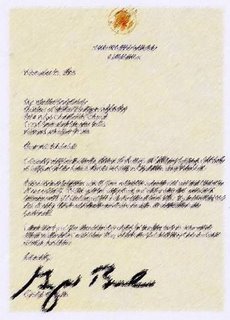
With contrition having suddenly emerged as a defining trait in his beleaguered second term, U.S. President George W. Bush seems to have used the holiday spirit to expand his gaze beyond Iraq, renditions and wire-tapping.
He has acknowledged the fallacy of equating King Gyanendra with Venezuela's Hugo Chavez and Zimbabwe's Robert Mugabe.
The U.S. Embassy in Kathmandu is refusing to comment on reports that Ambassador James F. Moriarty handed King Gyanendra a letter from President Bush urging the monarch to begin reconciliation talks with the parties. In Maila Baje's view, absence of denial, at least in this specific case, is sufficient confirmation.
King Gyanendra's visit to the United Nations that the Royal Palace never officially planned was put off last September not because of the black flags the Nepali diaspora had planned to unfurl. Nor because of subversion from the Maoists or mainstream parties, as each have claimed.
The monarch was put off by Bush's decision to strike him off the guest list to the traditional reception the U.S. president holds in honor of visiting heads of state or government.
The palace should have gotten an inkling of the impending snub. Weeks earlier, Moriarty had gone out of his way to publicly rule out any meeting between Bush and King Gyanendra in New York.
The king had good reason to be irked by Bush's poor social skills. For over a generation, Nepal has been totally pro-American – at least as far as its precarious location between China and India would permit. Our much demonized King Mahendra, for one, was invited by both the Republican Eisenhower and Democratic Johnson administrations. King Birendra himself was invited by none other than Ronald Reagan. (For the record, King Tribhuvan was planning to visit the U.S. but the State Department was in a quandary over his two wives. By the time the Americans got over the "bigamy" consideration, the monarch was already on the verge of death in Europe.)
Worse, Bush's equation of King Gyanendra with the Latin American and African strongmen wasn't fair. Chavez is plotting to create a leftist Latin America that would seek to humble America in its hemisphere.
Mugabe, a one-time Marxist, is forcing the United States to acknowledge complicity in Britain's colonial sins.
King Gyanendra, on the other hand, was planning to place Nepal's fight with the Maoist rebels squarely as part of Bush's war on terror. A president with a black-and-white "either-you're-with-us-or-against-us" vision shouldn't have been so shortsighted.
Indeed, Moriarty must have recognized the rapidity with which America was risking its foothold in Nepal. (His wife, the U.S. ambassador to Asia Pacific Economic Cooperation forum, was in a better position to provide a regional perspective to an administration that has become conspicuously Asia-centric in so many ways.)
So after his consultations in New Delhi last month, which coincided with the Maoist-mainstream confabulations there, Moriarty must have felt the urgency of a face-to-face briefing in DC. (Fluent in Chinese, Moriarty must have deciphered the view from Beijing in its pristine original official form.)
By this time, Washington had identified the principal architect of the de-Americanization of Indian foreign policy and acted. It had leaked enough combustible material portraying Indian Foreign Minister K. Natwar Singh – also a hawk on Nepal -- as an alleged beneficiary of the U.N./Saddam Hussein oil-for-food kickbacks to force him out of office.
The fact that news of Bush's letter was leaked by a palace official does not diminish its importance. Such a plea couldn’t have come without some moves toward reconciliation between the White House and Narayanhity – or at least the promise thereof.
Will Bush's turnaround facilitate the process of reconciliation in Nepal anytime soon? Can't say. Maila Baje will be watching for one sign: Sher Bahadur Deuba's fate.